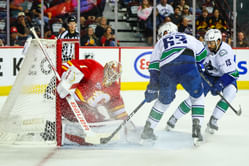
The National Hockey League (NHL) emerged in 1917, supplanting the National Hockey Association (NHA). Presently, comprising of 32 teams across America and Canada, the league is the fifth-highest grossing professional sport league in the World and
Every season, the league's pinnacle event is the awarding of the Stanley Cup, North America's oldest professional sports trophy, to the playoff champion. Renowned as one of the leading professional sports leagues in both the United States and Canada, the NHL boasts a global reputation as the foremost professional ice hockey league, featuring players from 17 different countries (during the 2023–24 season. Recognized by the International Ice Hockey Federation (IIHF), the Stanley Cup holds esteemed status as one of the most prestigious championships in hockey.
Who are restricted free agents?
A restricted free agent (RFA) in the NHL is a player whose contract has expired, but their current team still holds their rights. RFAs have limited negotiating power compared to unrestricted free agents (UFAs). To retain negotiating rights, the current team must extend a "qualifying offer" to the RFA, which is a one-year contract offer with a minimum salary based on the player's prior year's salary. If the qualifying offer is not made, the player becomes an unrestricted free agent. If the player rejects the qualifying offer, he remains an RFA, but if he does not sign before December 1, he becomes ineligible to play in the NHL for the remainder of the season.
The player and team can negotiate a different contract, but if the player signs an offer sheet with another team, his current team has seven days to match the offer or receive draft pick compensation from the team making the offer sheet. If the offer is matched, the player remains with his current team under the terms of the offer sheet. If the offer is declined, the player joins the new team, and compensatory draft picks are awarded to the player's former team based on the player's new salary.
If a contract dispute arises, either the player or his current team may file for salary arbitration, where both parties submit salary expectations, and an arbitrator renders a verdict. The team cannot request a salary reduction of more than 15%. Once the verdict is rendered, the team must decide within 48 hours whether to accept or decline. If declined, the player becomes an unrestricted free agent. A player can only be taken to arbitration once in his career, while there is no explicit limit on how many times a player can request arbitration before becoming a UFA.
How are restricted free agent contracts settled by a third party?
In the NHL, restricted free-agent contracts are settled through a process called salary arbitration. Both players and teams can elect to go to salary arbitration to determine the salary amount of the upcoming contract. This process involves a neutral third party, known as an arbitrator, who listens to arguments from both the player and the team.
Before the hearing, a date is set within two weeks, during which negotiations between the player and the team can still occur. While both parties can present their salary proposals to the arbitrator, certain limitations apply. For example, they cannot reference other players' salaries or the team's salary cap situation during the hearing. During the arbitration hearing, both sides can present evidence to support their case, including the player's performance statistics, injury history, length of service, leadership qualities, and contribution to the team's results. The arbitrator then renders a decision on the player's salary within 48 hours after the hearing concludes.
If a team elects to decline the arbitrator's decision, the player becomes an unrestricted free agent and is free to sign with any team. However, a player can only be taken to arbitration once in his career, and he can never receive less than 85% of his salary from the previous season. Additionally, there are specific eligibility criteria for players to file for salary arbitration based on their age and years of NHL experience.
Restricted Free Agents (RFAs) vs. unrestricted Free Agents (UFAs)
Restricted Free Agents (RFAs) and Unrestricted Free Agents (UFAs) are two distinct categories of players in professional sports leagues like the NHL. RFAs are players whose contracts have expired, but their current team retains certain rights over them. This means that the team has the exclusive right to negotiate a new contract with the player. While other teams can offer contracts to RFAs through offer sheets, the player's current team can match the offer and retain the player or choose not to match and receive draft pick compensation. RFAs are typically younger players or those with fewer years of experience in the league.
On the other hand, UFAs are players whose contracts have expired, and they are free to negotiate and sign contracts with any team without restrictions. They have the autonomy to explore offers from multiple teams and choose the one that best suits their preferences, such as salary, team competitiveness, and location. UFAs do not require draft pick compensation, and there are no penalties or restrictions for teams signing them. They often have more experience in the league and may command higher salaries due to their unrestricted status and ability to choose their next destination freely.
FAQ's On Restricted free agent in the NHL
A. A restricted free agent (RFA) in the NHL is a player whose contract has expired, but their current team still holds their rights. RFAs have limited negotiating power compared to unrestricted free agents (UFAs).
A. A player becomes a restricted free agent when their contract expires, but they do not meet the criteria for unrestricted free agency. This typically occurs when a player has not accrued enough years of NHL experience or is under a certain age threshold.
A. A qualifying offer is a one-year contract offer made by the player's current team to retain their rights as a restricted free agent. It includes a minimum salary based on the player's prior year's salary. If the qualifying offer is not made, the player becomes an unrestricted free agent.
A. Yes, other teams can offer contracts to restricted free agents through offer sheets. However, the player's current team has the option to match the offer and retain the player or decline and receive draft pick compensation from the team making the offer sheet.
A. If a restricted free agent signs an offer sheet with another team, their current team has seven days to match the offer or decline. If the offer is matched, the player remains with their current team under the terms of the offer sheet. If declined, the player joins the new team, and compensatory draft picks are awarded to the player's former team based on the player's new salary.









